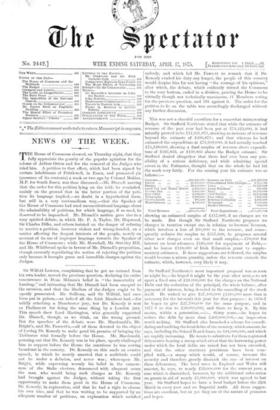Sir Wilfrid Lawson, complaining that he got no counsel from
his own leader, moved the previous question, declaring his entire concurrence in Dean Milman's belief in "the immortality of humbug," and intimating that Mr. Disraeli had been unequal to the occasion, and that the libellers of the Judges ought to be openly prosecuted. Mr. Sullivan, said Sir Wilfrid, had once been put in prison,—as indeed all the Irish Members had,—for mildly attacking a Manchester jury, but Dr. Kenealy is sent to Parliament for doing the same thing by a London jury. This speech drew Lord Hartington, who generally supported Mr. Disraeli, though, as we think, on the wrong ground. But the speeches of the debate were Mr. Macdonald's, Mr. Bright's, and Mr. Fawcett's,—all of them devoted to the object of forcing Dr. Kenealy to make good his promise of bringing the Tichborne trial formally before the House. Mr. Macdonald, pointing out that Dr. Kenealy was in his place, openly challenged him to support before the House the assertions he was sowing broadcast in the country. Dr. Kenealy on this made an evasive speech, in which he merely asserted that a multitude could not be under a delusion, and never was ; whereupon Mr. Bright, while expressing warmly his belief in the earnest- ness of the Stoke electors, denounced with eloquent scorn the man, who would bring such charges as Dr. Kenealy had brought against the Judges, without taking the first Opportunity to make them good in the House of Commons. Dr. Kenealy, in explanation, said that he had a right to choose his own time, and that he was waiting to be supported by an adequate number of petitions, an explanation which -satisfied
nobody, and which led Mr. Fawcett to remark that if Dr. Kenealy evaded his duty any longer, the people of this country would despise him for not having " the courage of his opinions," after which, the debate, which evidently stirred the Commons to the very bottom, ended in a division, proving the House to be virtually though not technically unanimous, 11 Members voting for the previous question, and 391 against it. The order for the petition to lie on the table was accordingly discharged without any further discussion.


































